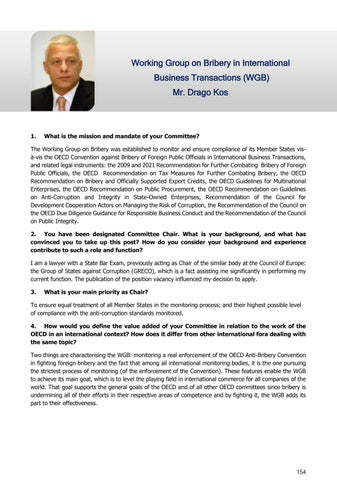Working Group on Bribery in International Business Transactions (WGB) Mr. Drago Kos
1.
What is the mission and mandate of your Committee?
The Working Group on Bribery was established to monitor and ensure compliance of its Member States visà-vis the OECD Convention against Bribery of Foreign Public Officials in International Business Transactions, and related legal instruments: the 2009 and 2021 Recommendation for Further Combating Bribery of Foreign Public Officials, the OECD Recommendation on Tax Measures for Further Combating Bribery, the OECD Recommendation on Bribery and Officially Supported Export Credits, the OECD Guidelines for Multinational Enterprises, the OECD Recommendation on Public Procurement, the OECD Recommendation on Guidelines on Anti-Corruption and Integrity in State-Owned Enterprises, Recommendation of the Council for Development Cooperation Actors on Managing the Risk of Corruption, the Recommendation of the Council on the OECD Due Diligence Guidance for Responsible Business Conduct and the Recommendation of the Council on Public Integrity. 2. You have been designated Committee Chair. What is your background, and what has convinced you to take up this post? How do you consider your background and experience contribute to such a role and function? I am a lawyer with a State Bar Exam, previously acting as Chair of the similar body at the Council of Europe: the Group of States against Corruption (GRECO), which is a fact assisting me significantly in performing my current function. The publication of the position vacancy influenced my decision to apply. 3.
What is your main priority as Chair?
To ensure equal treatment of all Member States in the monitoring process; and their highest possible level of compliance with the anti-corruption standards monitored. 4. How would you define the value added of your Committee in relation to the work of the OECD in an international context? How does it differ from other international fora dealing with the same topic? Two things are characterising the WGB: monitoring a real enforcement of the OECD Anti-Bribery Convention in fighting foreign bribery and the fact that among all international monitoring bodies, it is the one pursuing the strictest process of monitoring (of the enforcement of the Convention). These features enable the WGB to achieve its main goal, which is to level the playing field in international commerce for all companies of the world. That goal supports the general goals of the OECD and of all other OECD committees since bribery is undermining all of their efforts in their respective areas of competence and by fighting it, the WGB adds its part to their effectiveness.
154
















